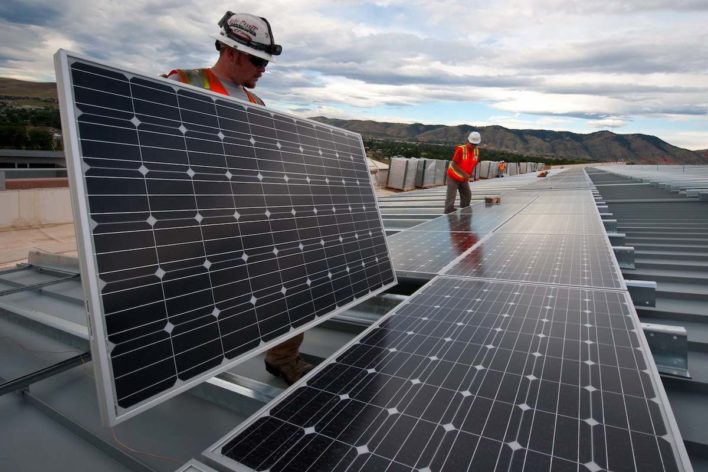Veteran Careers in the Solar Industry

Exciting Solar Industry Careers for Veterans
No matter what position you take with climate change, one thing everyone can agree on is that solar power is here to stay. I do not know what the future holds for our nation’s energy, especially as rolling blackouts in California are becoming routine. However, I do know that ever since Edmond Bacquerel discovered the photovoltaic effect in 1839, society has continued to study and invest in solar power. For veterans, there are unique opportunities designed just for us. Here we explore solar industry career options for veterans.
Solar Ready Vets Network
The United States Department of Energy (DoE) has sponsored the Solar Ready Vets Network which “engages solar industry employers, certified solar training providers, veterans service organizations and workforce development networks to support military service members and veterans pursuing solar industry careers.”
Through their Solar Energy Technologies Office (SETO), the DoE connects veterans and transitioning military service members with career training, professional development, and employment opportunities in the solar industry.
The Solar Ready Vets Network supports the military community by:
- Facilitating positive connections for successful careers
- Developing a model that standardizes a solar apprenticeship
- Establishing industry specific partnerships for education
- Promoting On-The-Job Training (OJT)
- Expanding GI Bill eligibility for solar training and education
If you are a veteran or transitioning service member, access the Veterans Page to get started.
3 Powerful Initiatives
- Solar Ready Vets Fellowship Program: This program places active duty service members in 12-week work-based learning programs with solar employers to facilitate the transition into a civilian career. This fellowship focuses on management and professional positions like technical sales, system design, supply chain logistics, project development. The Solar Foundation leads this program in partnership with the US Chamber of Commerce Foundation’s “Hiring Our Heroes” program and the Solar Energy Industries Association (SEIA).
- Solar Opportunities and Readiness (SOAR) Initiative: This program connects veterans with solar training, credentialing, professional development, and employment opportunities. SOAR’s goals are to establish an apprenticeship recognized by the Department of Labor, expand the eligibility of solar training for GI Bill benefits, and define expedited pathways to solar certifications based on military experience and qualifications. The Solar Foundation leads this program in partnership with the North American Board of Certified Energy Practitioners (NABCEP) and SEIA.
- Cyberguardians and STEM Warriors: This project is led by SunSpec Alliance and provides training for veterans in cybersecurity and information technology. This is a three-year program designed to prepare military veteran job seekers training on Distributed Energy Resource (DER) technology. Methods and resources include online modules, accredited curricula, and hybrid training programs focused on designing systems for distributed energy resources, as well as grid operations, data analytics, cybersecurity, and investment decision support. For this program, check out their Cyberguardians
Solar Credentialing for Veterans
The Solar Ready Vets team, in collaboration with the NABCEP, has established GI Eligibility for the Photovoltaic Associate (PVA) Program. With this approval by the Department of Veterans Affairs (VA), veterans and service members transitioning to the civilian workforce can now apply for reimbursement of all NABCEP PV-related exams.
As of 2018, all of the following exams are eligible for reimbursement:
- PV Associate (PVA) Exam
- PV Installation Professional (PVIP)
- PV Design Specialist (PVDS)
- PV Installation Specialist (PVIS)
- PV Commissioning & Maintenance (PVCMS)
- PV Technical Sales (PVTS)
- PV System Inspector (PVSI)
Occupational Outlook
In 2019, the median pay for a Solar Photovoltaic Installer was $44,890 per year, or $21.58 per hour. That’s not bad for an entry-level job that only requires a high school diploma. It’s certainly more than they paid me as a private in the mid-1990s! The job outlook for this career is expecting growth in the field of 51% between 2019 and 2029, which is much faster than average.
If you fall more on the computer side of the solar-powered house, the 2019 median pay for Information Security Analysts was $99,730 per year, or $47.95 per hour. While the Department of Labor does list a bachelor’s degree as the typical entry level education, there are programs like the Cyberguardians and STEM Warriors program mentioned above that fully prepare you for a cyber career specific to the energy industry. This career field is expected to grow at a rate of 31% between 2019 and 2029.
Background Information
In 2014, the US Department of Energy launched Solar Ready Vets as a pilot program to prepare US Veterans for careers as photovoltaic system installers, sales representatives, system inspectors, and other roles within the solar industry.
In 2017, Solar Ready Vets became an independent program administered by participating military bases, using tools and partnerships developed during the pilot phase. More than 500 students over 35 cohorts and in 10 different states graduated from the pilot program. The US Department of Defense’s SkillBridge initiative enabled the training by allowing transitioning service members to pursue civilian training, apprenticeships, and internships up to six months prior to their separation.
Success Stories
For some success stories and testaments from other veterans, check out their awesome Service to Solar page that offers advice and guidance from fellow veterans who have gone through these various programs and are serving in the solar industry.
If you’ve ever considered a career in the solar industry, or even in an IT role specific to the solar industry, then these programs are an amazing opportunity to power your next career!
(Image courtesy of Mark Agnor via www.123rf.com)
RELATED:
- 5 Insider Tips for Navigating USAJOBS
- How to Prepare For and Find a Remote Job
- Virtual Job Fairs for Military and Veterans
- 11 Ways To Save Money and Energy in Your Military Home
- 10 Things Employers Need to Know About Veteran Employees
About the author
Julie Provost is a freelance writer, and blogger. She lives in Tennessee with her National Guard husband and three boys.


